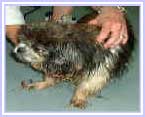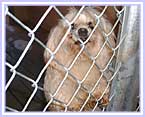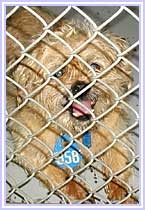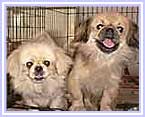Beware of Puppy Mills
Animals that come
from puppy mills can be unhealthy and they can also exhibit
behavioral problems. Their lack of contact with people and their
early removal from their mother often result in unsocial behaviors
which surface as the puppy grows up.
Puppy mills are rarely, if ever, monitored by state governments.
The U.S. Department of Agriculture is responsible for monitoring
and inspecting kennels to make sure they are not violating the
housing standards of the Animal Welfare Act. Unfortunately,
kennel inspections take low priority at the USDA and kennels
are not regularly inspected.
On the whole, it appears that small "mom-and-pop"
operations are worse than large-scale concerns. Although they
can breed large numbers of pets, the smaller facilities have
limited funds to make necessary corrections. If called to account
for inhumane condition, they often win the leniency of local
judges who are prone to let them off.
Transportation is another aspect of pet abuse that needs attention.
The manner in which cats and dogs are shipped from breeding
kennels to retail outlets is frequently scandalous. Shipment
from puppy mills can cover hundreds of miles by pick-up trucks,
tractor-trailers, and/or planes without adequate food, water,
ventilation, or shelter. These transport firms are supposed
to be subject to USDA inspection, but it appears that a more
rigorous application of the regulations is in order.
It is the position
of the National Humane Education Society that the breeding,
transportation, and sale of pets be done only under humane
conditions to prevent needless suffering. This means requiring
pet wholesalers, shipping companies, and pet shop retailers
to maintain standards that will guarantee the humane well-being
of the animals in their care.
The Society agrees with those who hold that inhumane conditions
in the pet industry continue to be widespread and scandalous.
We believe that education will help redress those wrongs,
but we are convinced that strict enforcement of federal and
local regulations is also essential. We think that more, not
fewer, inspections are called for, particularly in the transportation
and retail sale of pets. It is unrealistic to assume that
the pet industry can regulate itself.
The Society hold
that humane individuals and groups have a major role to play
in preventing animal abuse. We suggest the following actions
to stop the atrocities cause by puppy mills:
Adopt a pet from
your local animal shelter or humane society. We believe that
it is unwise to breed many more hundreds of thousands of pets
each year while the nation's shelters are overcrowded with
unwanted and unclaimed pets destined for euthanasia.
Refuse to shop in pets stores that sell puppies. If enough
people stop purchasing pets from pet shops, profit loss could
compel store owners to reconsider their trade.
If you are intent on purchasing a special breed, locate a
reputable breeder who provides references and welcomes visitors.
Ask for increased monitoring and inspections of kennels in
accordance to the standards set in the Animal Welfare Act.
Insist that repeated violators have their license revoked.
Write to the Secretary of the Department of Agriculture, 14th
Street & Independence Avenue, SW, Washington, DC 20250.
Puppy mills are
commercial kennels where animals are bred for the pet store
market. Pet shops use the natural appeal of puppies to sell
these animals at a high price, usually several hundred dollars
for a "purebred" animal. Breeding kennels are located
across the United States, but many are concentrated in the
Midwest, Pennsylvania, and Florida. Approximately 5,000 puppy
mills are believed to exist but pinning down the exact number
is difficult since many pf these operations are not licensed.
Puppy mill kennels usually consist of small wood and wire
mesh cages kept outdoors. Female dogs are bred continuously,
with no rest between heat cycles. Mother and their litters
often suffer from malnutrition, exposure, and lack of adequate
veterinary care. Continuous breeding takes its tolls on the
females, and they are killed when their bodies give out and
can no longer produce enough litters.
|



















